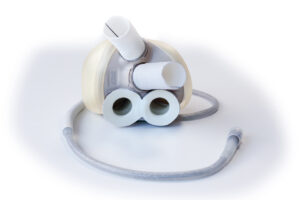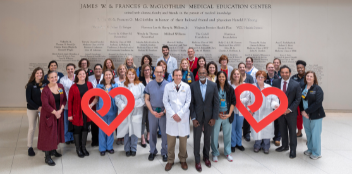VCU Medical Center leading clinical trial of advanced artificial heart
VCU Medical Center is one of seven U.S. clinical trial sites for the world’s most advanced artificial heart.
 Dr. Vigneshwar Kasirajan
Dr. Vigneshwar Kasirajan
Most patients with advanced heart failure can be managed by a left ventricular assist device (LVAD). But some have no option but a heart transplant or the current version of a total artificial heart.
Heart surgeon Dr. Vigneshwar Kasirajan, chair of the VCU Health Department of Surgery, is principal investigator of the CARMAT clinical trial that begins this fall and will enroll approximately 10 patients. We asked Kasirajan for details.
What is CARMAT?
CARMAT, which is also the name of the company that makes it, is a total artificial heart. It replaces both lower pumping chambers of the heart. It’s very similar to the artificial heart we have right now, a device made by a company called SynCardia that’s pneumatically (air) powered. CARMAT’s pump is fully implantable and electrically driven.
What’s the goal of the trial?
This is a trial to prove that the CARMAT total artificial heart can meet FDA standards for performance and safety.
 The CARMAT total artificial heart
The CARMAT total artificial heart
Why is this trial significant?
In the U.S., the total number of heart transplants done per year is approximately 3,000. The total number of patients per year who would benefit from a heart replacement is probably 50-60,000. No matter how hard we work to increase the number of donors available for heart transplantation, that gap is too broad. We need an off-the-shelf device that could be used for the variety of patients, different sizes, different ages, and produce good outcomes similar to a heart transplantation. I think in another five to 10 years, we will make multiple modifications of the CARMAT device to benefit a number of patients with advanced heart disease who could then have a pump put in and maintain a good quality of life. That’s what we want to get to.
How did VCU become a test site?
VCU Health has a lot of experience with artificial hearts,
and we have had some of the best outcomes in the world. CARMAT came to us because of our experience with artificial heart technology, patient management, patient selection and good outcomes.
For whom is the CARMAT heart designed?
A: The CARMAT heart is meant for patients with advanced heart failure who require a heart transplant. So, while they’re waiting, if they get very sick, they could potentially go to the CARMAT artificial heart and then go towards the transplant. Once the pump is in, it will stabilize them. A drawback of the device is that it’s fairly big. It doesn’t fit everybody. So, the device would not fit a smaller woman.
How many patients will be included? And how will they be selected?
The initial trial is seven patients nationally. We have a lot of patients who would benefit from the artificial heart technology, but because this is new technology, the trial is being restricted to the small group to allow us to study their outcomes carefully before we expand the use. Participants will be patients whom we evaluate for heart transplantation, and they may have severe biventricular failure. They are not going to be able to wait for a heart for many months, and potentially they would need to go to an LVAD device to take them to a heart transplant safely. We screen patients every day. We’re the largest heart transplant program in Virginia, and I think we’ll see a lot of patients being referred to us.
Describe the timeline.
It’ll take probably two to three years to enroll enough patients. The goal for the trial is to get the patients that are on the device to transplantation or for survival up to six months.
Describe the team you’re working with. Who else in the health system is involved in CARMAT?
We’ll have four surgeons trained, and two or three of us will scrub in together for the first implant surgery. There’s a whole ICU nursing team. There’s ICU critical care physicians who need to understand how to manage the patient postoperatively. There’s a whole group of cardiac anesthesiologists, physician’s assistants and fellows. The device coordinators manage the patients when they’re home. So, we’re looking at 40 to 50 people who need to really understand the intricacies of the device. For a trial like this, we would train for weeks before even conducting the first implant.
What does hosting this trial mean to Pauley?
VCU Health is focused on innovation to benefit patients. We’re constantly looking at new ways to make it better for them. That can be done only by working together in large teams, in a complex system where we can partner with industry or other areas to create new knowledge and new technology. There are lots of things we need to learn as we go forward, but as an institution and as a heart center, to be able to be a part of a large trial like this, to help patients in the future, this trial is a very exciting step for us.
If someone thinks that they may be a good candidate, how do they enroll?
If you think you may be a good candidate, speak with your cardiologist. We anticipate receiving referrals to our heart transplant and heart failure team from colleagues around the country.
Learn more about CARMAT: https://www.carmatsa.com/produit/
Learn more about Pauley’s Heart Failure Program: https://www.vcuhealth.org/pauley-heart-center/our-expertise/heart-failure-program
Back to Autumn-2020

